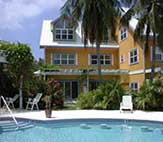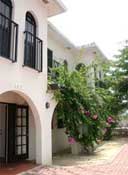Buying costs are high in Cayman Islands
How high are realtors' and lawyers' fees in the Cayman Islands? What about other property purchase costs?
Transaction Costs |
||
| Who Pays? | ||
| Stamp Duty on Assignment | KYD244 (US$200) | buyer |
| Stamp Duty on Conveyance | 7.50% | buyer |
| Legal Fees | 1.00% - 3.00% | buyer |
| Real Estate Agent's Commission | 5.0% - 10.0% | seller |
| Costs paid by buyer | 8.50% - 10.50% | |
| Costs paid by seller | 5.00% - 10.00% | |
| ROUNDTRIP TRANSACTION COSTS | 13.50% - 20.50% | |
| See Footnotes Source: Global Property Guide |
||
How difficult is the property purchase process in the Cayman Islands?
There are no restrictions on foreign ownership of property. The absence of taxes and restrictions on foreign ownership of land makes investing in the Cayman Islands very attractive. There is an active real estate market, which provides much information through real estate agents and local media advertising.
Most land in the Cayman Islands is privately owned. To protect ownership and rights to property, the government has set up an efficient system of land registration under the Registered Land Law. Every piece of land is registered as a result of a cadastral survey conducted in the 1970's.

An important feature of the Land Registry is that it contains all records pertaining to any parcel of land, whether it is ownership interests, mortgages and charges against the land, easements and restrictions, or other legal and equitable interests in the land, which are available to the public. This serves as a government guarantee on real estate investments. Once an individual has decided on a prospective property to purchase, he should check the Land Registry to verify any information he has been given.
The purchasing process is relatively easy. Local laws require the prospective buyers to present personal documents, including certificates of identification and confirmation of the source of funds, to the real estate agent. Prospective buyers must then file a "Search and Stay" status on the land with the Department of Lands and Surveys upon entering into a contract. This essentially grants the purchaser a priority period during which the property is put on "freeze" mode, preventing any other interest from being registered against the land until the property has been officially transferred. A 10% deposit is subsequently required of the purchaser, and should be paid within a week of signing the contract.
Stamp duty is the only major closing cost in the Caymans. Stamp duties were dropped to 5% from 7.5% to 9% in 2001, following the 9-11 terrorist attacks in the US. Initially, this concession was to expire in November 2002. However, the Government has granted several extensions until 2007.
In the Stamp Duty Law (2007 Revision), the stamp duty on the transfer of immovable property in the prime locations of West Bay and George Town was set at 7.5%. On other areas, stamp duty was 4% for residents and 6% for foreigners. A registration fee of CI$50 (US$60) is required for the stamp duty.
Stamp duty was again temporarily reduced by as much as 33% for six months starting April 1, 2009, as part of an effort to lure foreign investors into the local property market (Stamp Duty Law Temporary Revisions of 2009).
In the prime areas of West Bay, George Town and Seven Mile Beach, stamp duty was reduced from 7.5% to 5%. In other areas, stamp duty was slashed to 3% for Caymanians and to 5% for foreigners.
To transfer the property title to the purchaser, the stamp duty must be paid to the Government within 45 days of closing. Closing periods range between 30 to 90 days. The actual process of closing does not normally require personal appearance, and most transactions are conducted by phone, fax, or courier.

The purchase of condominium units (commonly referred to as strata lots) is treated in the same manner as any transfer of real property. A major consideration when purchasing strata lots is that all proprietors of such lots in the same strata plan (building) automatically form a strata corporation. The proprietors are bound to follow regulations pertaining to the maintenance, administration, use, and enjoyment of such lots and common property as expressed in the by-laws of the corporation. Furthermore, a strata corporation is subject to statutory duties stipulated by the law (i.e. insurance and maintenance of buildings).
Footnotes to Transaction Costs Table
The round trip transaction costs include all costs of buying and then re-selling a property - lawyers' fees, notaries' fees, registration fees, taxes, agents' fees, etc.

 Currency:
Currency:
Cayman Islands uses Cayman Islands Dollar (KYD), which is pegged to the US dollar at KTD1.2 = US$1. The US dollar is widely accepted throughout the islands. The property is in the City of George Town, in the island of Grand Cayman.

 Stamp Duty on Assignment:
Stamp Duty on Assignment:
Stamp Duty of KYD244 (US$200) is paid on "Assignment of any rights under an agreement or memorandum of agreement for or in relation to the purchase of or an interest in any land, strata title or other immovable property where there is no consideration."

 Stamp Duty on Conveyance or Transfer:
Stamp Duty on Conveyance or Transfer:
Stamp Duty on Conveyance or Transfer of immovable property is generally levied at 7.5% of property value.
Reduced rates of 0% and 2% may apply to first-time Caymanian purchasers of real property under certain conditions.

 Legal Fees:
Legal Fees:
Legal and other registration costs can add around 1% to 3% of property value to the total cost.

 Real Estate Agent's Fee:
Real Estate Agent's Fee:
Real estate agent commission ranges from 5% to 10%, depending on the property price. It is typically paid by the seller. Most agents are members of the Cayman Islands Real Estate Board Association (CIREBA).